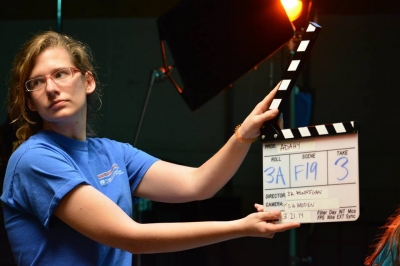In 2015, the Freshman Research Initiative (FRI) celebrates its 10th anniversary. In honor of that milestone, we are checking in with some of the alumni of the FRI program who use what they learn in interesting ways. Olivia Biehle, an undergraduate double-majoring in Mathematics and Radio-TV-Film, combines her two very different passions through 3D filmmaking. She also used movie-making skills in her involvement with the Cosmic Dawn FRI research stream, as she explains in an interview.

What was your experience with the Freshman Research Initiative?
I was part of FRI for four semesters in the Cosmic Dawn stream [astronomy professor Paul Shapiro's former research stream on how the first galaxies formed, ended the dark ages, and reionized the universe]. I was a student, summer fellow and a mentor. My focus was on making visualizations and movies of our simulation box that we used to study dark matter halos.
How does your work with film and math intersect?
There's some math with producing, and that's just number-crunching. And editing is problem-solving, I guess, putting pieces of a puzzle together. So it's kind of just two different worlds, and I just try to put them together when I can.
Do you think that one of them is more prevalent for you?
The skills I learn in film are just as important as the ones I learn in math. But when people see "math," they think "academia;" when they see "film" they see "art." I could see myself teaching, but it's not something I absolutely love doing. I really like making movies, and math helps out along the way.
How so?
Basic problem solving — logic and reasoning. Math isn't just number-crunching, like a lot of people think. It's a lot of writing proofs, and having some logic in solving a problem and trying to fix it. So with producing, it's like, "We have a problem. How do I fix it?" That's my job. So it's the way that you're thinking that applies. I mean, knowing the definition of a limit might not come in handy when I'm making a movie, but the ways in which I find that definition or work that proof out—it's the same kind of reasoning that I use.
So filmmaking is a mathematical process for you. 
For me it is. I know for lots of others it's a creative process, but that's why I love 3D, because I get to use my mathematical side to make creative decisions. Thinking about how far away things are, what we want to be coming out of the screen and what we want to be behind the screen, the types of lenses that you're using, knowing what kind of look you're going for—that's all very mathematical.
Can you describe the math behind your 3D work?
Last semester we were able to use some of the 3D cameras, like the beam-splitter, which is where you have two cameras perpendicular to one another, and one shoots through glass while the other shoots through a mirror. And all the different controls that you're using, like your interaxial distance—how far the cameras are from each other—changes your look. The rotation of the cameras changes your look. Your convergence point—what's in 3D and what's not in 3D—to me it all had to do with thinking of the world as a three-vector space, which I learned in linear algebra.
What would you say to people looking to double-major in two separate fields?
It took a lot of hard work to make it happen. But I did it. I was always told "Why would you do two different majors, two different degrees, in two completely separate fields?" It's because I just really like both. It's because I think math is important, and it's one of my skill sets just as much as I love film. So if there's anybody that wants to double major in two completely different fields, people are going to tell you that it's weird. I always get "Oh, that's an interesting combination." But it's worth it. Because it's something that I like to do.


















Comments